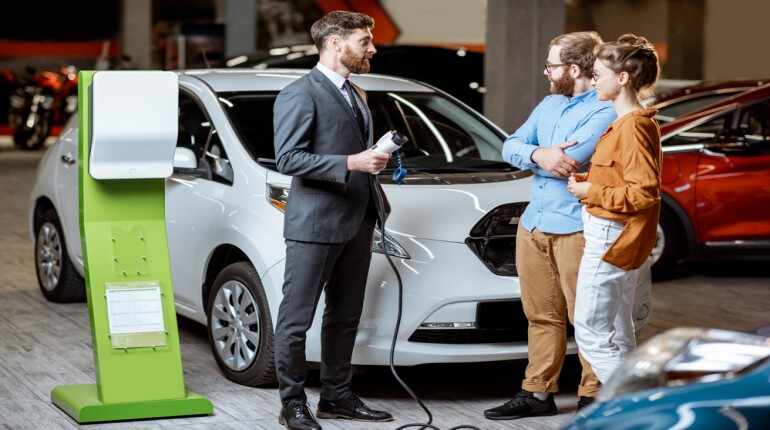Electric cars are becoming increasingly popular in the UK as more consumers look for ways to lower their environmental footprint and save on fuel costs. However, for many buyers, the price of a new electric car can be exceptionally high. This is where buying a used electric car comes in as a great alternative.
But as with any second-hand car purchase, buying a used electric vehicle comes with some risks. So before you rush in, please research and thoroughly inspect the car, and check its paperwork and service history records to make an informed decision.

Are used electric vehicles a smart purchase?
As electric vehicles become very common in the UK, it’s expected that this will lead to lower prices and more choices, as well as lower running costs compared with petrol or diesel engines. However, it is essential to also be aware of potential drawbacks before deciding.
Start with the issue of charging:
When it comes to powering an electric car, one of the primary considerations for used EV buyers is the availability of charging stations. Although the number of public charging points is increasing, it’s crucial to ensure that you have easy access to them, or you can install a charging point at home under the Electric vehicle home charge scheme (EVHS).
Range anxiety:
Another main issue with used electric vehicles is their driving range. While newer models have larger batteries and greater efficiency, allowing for ranges of over 300 miles per charge, older used models may only have a range of 200 miles or less, making them less practical for long-distance travel.
Battery lease:
Battery leasing is becoming less frequent in modern electric vehicles (EVs) because the batteries have shown to be more reliable than initially expected. However, check whether the battery pack is included in the purchase price, or you’ll have to pay a monthly battery lease bill once you buy the car.
Do electric vehicle batteries degrade over time?
Yes, electric vehicle (EV) batteries do degrade over time. Just like a smartphone, for example, the traction battery in an EV can lose some of its capacity to charge, which means that the potential range and performance of the vehicle will be reduced as the battery degrades.
However, most new electric cars come with an eight-year battery warranty from the car manufacturer, which guarantees 70 per cent of its capacity. This means that the car’s battery should still have good health for a used EV up to eight years old.
What should I look out for when buying a used EV?
When you inspect a used electric car, it is essential to pay attention to the condition of the tires. Electric vehicles tend to wear more on the tires due to the instant torque they can produce and their typically heavier weight than traditional gasoline or diesel cars. It’s vital to ensure the tires have plenty of treads and are in good condition before deciding to purchase.
Additionally, it is vital to check the vehicle’s full-service history. This indicates that the previous owner has taken good care of the car and that the vehicle should have received the latest software updates and any recall work that may have been necessary.
A test drive of an EV is essential before the purchase to get a feel for the car, its condition, and its range and power capabilities. It is important to listen out for any odd noises, bumps, or vibrations and, if any doubts arise, look for another car, as safety should always be the priority.
Frequently Asked questions
How much does it cost to charge an electric car?
The cost of charging an electric vehicle (EVs) in the UK varies depending on the cost of electricity, the size of the battery, and the charging method. On average, it can cost anywhere from £5 to £15 to fully charge a typical electric car, but this can vary widely. Charging at home using a standard electrical outlet is usually the most cost-effective option while using a public fast charger can be more expensive.
How long do electric car batteries last ?
The lifespan of an electric car battery varies, but most are designed to last for 8 to 10 years or up to 150,000 to 200,000 km. The actual lifespan of a battery will depend on various factors such as usage patterns, charging habits, temperature, and more. Most electric car manufacturers offer a warranty for the battery, typically covering it for 8 years or more.
Do electric cars need an MOT?
MOT tests are designed to ensure that vehicles are safe for the road. After three years of ownership, both electric and gasoline/diesel-powered vehicles must pass the MOT test. The main difference between MOTs for electric vehicles (EVs) and other vehicles is that there is no emissions or noise test for EVs, since they produce zero tailpipe emissions and are very quiet.
Do electric cars pay road tax?
Electric cars in the UK are currently exempt from Vehicle Excise Duty (VED), also known as road tax, until April 2025. After that, electric car owners will be liable to pay the lowest first-year rate of VED.
Is insurance cheaper on electric cars?
Insurance for EVs can be higher due to factors such as limited availability of spare parts and need for specialist mechanics. However, prices for insuring EVs are likely to decrease as they become more common and the market for EVs grows.
